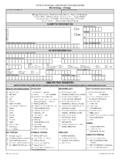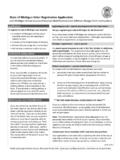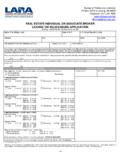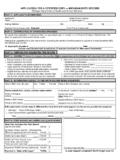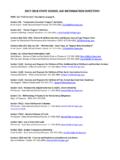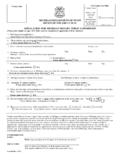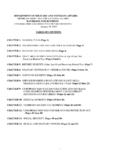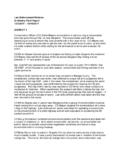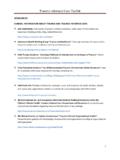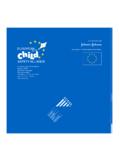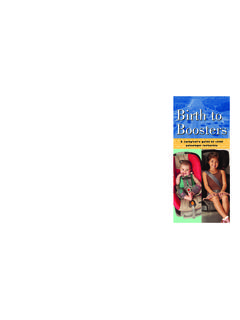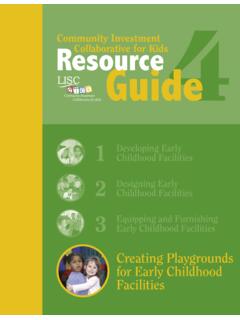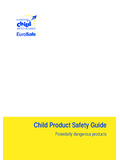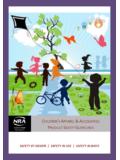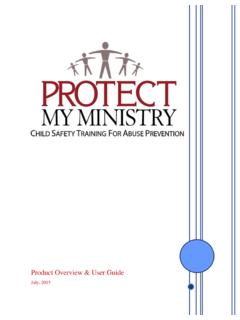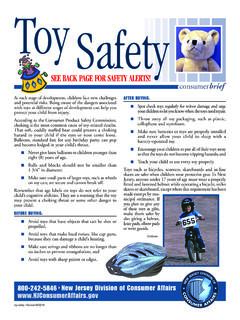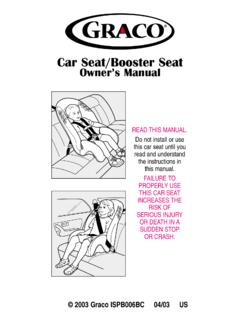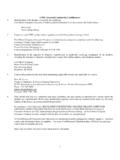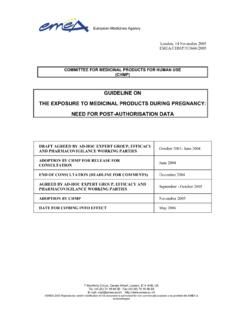Transcription of Michigan Child Care Matters
1 1 Michigan Child Care Matters - Summer 2012 Issue 94 Registrant and Licensee Responsibilities From the Division DirectorMichigan Child Care MattersMICHIGAN DEPARTMENT OF HUMAN SERVICESB ureau of Children and Adult LicensingChild Care Licensing Child Care Matters - Summer 2012 Regulated Child care providers have an awesome responsibility! Working with children and parents, working with staff and volunteers and maintaining compliance with licensing rules can each be full-time jobs. This issue of Michigan Child Care Matters focuses on many of the responsibilities you have as a licensed or registered Child care provider. The Bureau of Children and Adult Licensing (BCAL) has a number of resources designed to help you comply with licensing website has a section devoted specifi cally to information for providers.
2 You can fi nd it at in the left column under Licensed Provider Resources: There are links to the licensing rules and the Child Care Organizations Act (1973 PA 116). The Technical Assistance link takes you to our Technical Assistance and Consultation manuals. They provide an explanation for the purpose behind many of the licensing rules. The manuals detail what is necessary to comply with a rule, as well as best practice suggestions that will help you improve the quality of your program. The Forms link allows you to download all forms required by licensing. Many of the forms are in a fi llable PDF format, allowing you to save the form to your computer and fi ll in the necessary information electronically before printing it out.
3 (This is a great way to have parents complete Child Information Records.) The Resources link offers in-depth information on a variety of topics, including the Michigan Department of Education s Early Childhood Standards of Quality, Child health and safety and Child behavior. The Newsletter link takes you to all previous issues of this publication. There is a topic index to help you search for issues of particular interest to you. And remember, the back page of each issue has the updated list of the Consumer product safety Commission (CPSC) product Recalls. Posting the most current recall list is all you need to do to comply with the on page 172 Michigan Child Care Matters - Summer 2012 Table of Contents2 You Asked, Licensing Answers6 What Policies are Required to Run My Business?
4 8 Child Care Record Organization9 Hiring Employees 10 Understanding Ratio and Capacity 12 When to Contact Your Licensing Consultant14 What are a Licensing Consultant s Responsibities15 Accident, Injury, Illness Reporting16 Confi dentiality in Child Care Settings18 Child Development and Care Payment Changes20 CPSC RecallsYou Asked, Licensing Answers Licensing consultants receive many questions from registrants and licensees. Here are a few of the most common ones related to registrant and licensee responsibilities. You can fi nd more frequently asked questions on the Child care licensing website at ?
5 Who can visit and pick up children in care?A Parents are allowed to visit their children while they are in care. Providers cannot prohibit a parent from visiting or picking up his or her Child unless there is a court order that indicates the parent has limited access to his or her Child . Child care centers must have this court order limiting access on fi le. It is important for providers to carefully read the court order to ensure that they understand the specifi c custody arrangement, instead of relying on the parent for this information. This is not intended as a means for ongoing parental visitation by the non-custodial is important to ensure that both parents are listed on the Child Information Record (BCAL-3731), or comparable substitute, regardless of whether they have custody of the Child .
6 A parent s failure to list the other parent on the card does not take away that parent s right to have access to his or her Child . It is the provider s responsibility to ensure the Child information card is accurate and or legal guardians can limit an individual or relative from visiting or picking up their Child . When an individual other than the Child s parent or legal guardian arrives to visit or pick up a Child , it is necessary to ensure that permission for this visitation or release occurred. This permission should be obtained in writing. It is recommended that providers check the identifi cation of the individual to ensure they are releasing the Child to the correct person. An individual password created by the parent can also be used to help identify the is important for providers to ensure that paperwork is complete and on fi le prior to enrollment to avoid potential Michigan Child Care Matters - Summer 2012?
7 What are the rules about smoking?A The Child Care Organizations Act (1973 PA 116) and the licensing rules defi ne smoking and when and where it is prohibited. All Child care facilities must assure that employees, volunteers, parents, and visitors comply with the act and these rules. Scientifi c evidence has linked respiratory health risks to secondhand smoke. Infants and young children exposed to secondhand smoke are at risk of developing bronchitis, pneumonia and middle-ear infections when common respiratory infections occur. Secondhand smoke may also increase the risk of infant death. In Child care homes, smoking must not occur in the home or on the premises during Child care hours. Premises means the Child care home where the caregiver and family reside and includes the attached yard, garage, basement, and any other buildings located on the property.
8 A no smoking sign must be posted in a conspicuous place, which means a location where parents, assistant caregivers and others can easily see it. The caregiver shall notify parents if smoking occurs in the Child care home and on the premises when children are not in care. Smoking must not occur in Child care centers or on the property that is under the control of the center, including when children are not in care. Smoking must not occur on fi eld trips or in vehicles when children are present. Centers must post a no smoking sign at the center as a reminder to parents or other visitors that smoking is not allowed in the center or on the property. The Surgeon General has concluded that the only way to fully protect yourself and your loved ones from the dangers of secondhand smoke is through 100% smoke-free environments.
9 As a Child care facility, your duty is to provide a safe environment for is a modifi cation request needed?A A modifi cation request is needed any time a Child care facility plans to change the registration/license capacity, the ages of the children served, the Child use space or the program components offered. All requests must be submitted in writing to your licensing consultant for processing. You can fi nd the Request for Modifi cation of the Terms of the Registration/License form on the licensing website at An environmental health inspection, a fi re safety inspection and/or a lead hazard risk assessment may be required for Child care centers. Your licensing consultant will notify you if these inspections are needed.
10 The licensee is responsible for paying for and scheduling these inspections. The requested change must be approved before it becomes effective. An on-site inspection may be required. The licensing consultant makes a recommendation to approve or deny the requested change. The request is then approved or denied by the area manager and then the registrant/licensee is notifi ed in writing of the When licensing reviews my training records, what information is needed?A Family and group home providers are responsible for obtaining verifi cation of attendance at training for themselves and any assistant caregivers. Centers are responsible for having 4 Michigan Child Care Matters - Summer 2012verifi cation of attendance for all caregivers.

